Dr. Krupp was terrified. In all his years of selling snake oil throughout the frontier — a figure he often exaggerated, but in truth amounted to no more than three years — he had seen many remarkable things but never had he seen Dr. Bartoleermere the Second’s Magic Elixir actually work. But it had happened. He had seen the little girl’s wound heal! And Dr. Krupp had no idea what to do next.
As townspeople rushed about, frantic with news of the attack, Dr. Krupp walked in a circle in the center of town talking to himself. First, he wanted a drink but then he turned sharply and walked towards the livery stable and his wagon full of elixir. Then he looked around him in terror, certain he was being followed. Grantham, like all frontier towns, was filled with desperate characters; gamblers, miners, drovers, and cowboys down on their luck. What he had was absolutely priceless. Worth more than silver or gold.
The patter sprang into his mind unbidden, "the Elixir of life itself… Freedom from man’s age-old enemies, pain, and death. The lauded and once mythical Panacea now made available through the miracles of the modern age.” What a pitch! And all the better for actually being true. He smiled to himself, then he frowned and changed directions once again.
His wagon had elaborately painted canvas tarps on either side that proclaimed the value and wonder of Dr. Bartoleermere the Second’s Magic Elixir. The idea was to make it so a passerby couldn't help but notice such a magnificent example of the sign-maker’s art. And that cinched the argument. In a fright, he hastened to the freight yard knowing he must remove the signs and disguise his wagon.
Along the way, he passed the Preacher crying out to the people of Grantham as he stood upon an overturned bucket. He was telling the people that these strange happenings were the work of the Lord. These signs and portents were meant to call the faithful to arms. Dr. Krupp avoided the Preacher’s gaze as he pushed his way through the crowd, afraid that the man might call him out… afraid of what that man might say.
He crossed the main street, ducked through a narrow alley, and emerged on the edge of the freight yard. Wagons of all shapes and sizes crowded the dusty lot, but from the street, he could not see his wagon and sighed in relief. For the first time in his life, he was grateful that his advertising was obscured from the public.
He checked to see that he was not being followed and then hurried in among the wagons with surprising speed for a man of his girth. Behind two battered Conestoga wagons, he found his rig with its colorful signs. He had paid five dollars a side to get them done in San Francisco and they were worth every penny. In fact, he had paid more for the signs than he had to get the patent medicine brewed, bottled, and labeled.
In truth, the contents of the bottles had never been important. Grain alcohol, some hop, and something bitter would do it. Bitter because everyone knew that good-tasting things never made good medicine. And that was the secret, no one ever bought or sold a chemical formula. They paid for the prospect of relief from their ailments. And luckily for Dr. Krupp, the western territories were an endless wellspring of ailments. Wrenched backs, aching teeth, consumption, dysentery, hangover, boils, the pox, snakebite, yellow fever, tuberculosis, argue, gout, la grippa –- if you name a man's pain in detail he will believe that you have the cure for him. The secret wasn't in the bottle and never had been. It was in the *salesmanship.*
At least it had been. But now… He shuttered to think what a working formula meant. If the one thing he was certain was fake turned out to be real… then was anything real? Was everything fake? Had he been the one being conned all along. He was lost in his own understanding.
He climbed up on the side of the wagon and started untying the painted tarpaulin. As he worked he heard a strained cough behind him. He turned in terror, nearly falling off the wagon, but caught himself and dropped awkwardly to the ground. Off-guard and looking more like a thief than a proprietor he stared wide-eyed at the figure before him.
Jean DuMont tapped his heavy cane on the ground, coughed into his handkerchief said, “I believe you have the medicine that I require.”
Dr. Krupp opened and closed his mouth several times, looking more like a fish straining water through his gills, than the sharp-eyed huckster that he had been. Finally, his instincts kicked in and he said, “Well sir, you have come to the right place. The miraculous properties of the long-lost Panacea can be yours, for a price, of course.”
“I assure you, money is no object,” said DuMont, playing along, “I am as rich as Croesus.” He was overcome by a coughing fit, then continued, “And eager to pay. But there is but one consideration. What guarantee of efficacy do I have?”
“You have not heard of the remarkable transformation that Dr. Bartloleermere’s Elixir effected in the young girl who was mortally wounded at the river?”
“Yes,” said DuMont, “But I did not see it.”
“I assure you, as a gentleman, that this marvelous elixir,” he said, patting the side of his wagon, “will cure what ails you, or,” and he cringed to hear himself saying the words, “Or your money back. Would that be acceptable?”
“Usually, your terms would be quite favorable, but these are… unusual times… so I will need a demonstration,” said DuMont. And then shot Dr. Krupp in the stomach with his derringer.
It happened so fast that, Krupp didn’t understand that he had been shot. The barrels of the gun went off with a sound that seemed a little louder than the popping of the cork from a champagne bottle. There was no pain, but he felt a wetness on his abdomen, and when he touched his hand to his belly, it came away covered with blood. Dr. Krupp grew light-headed and slumped to the ground, still confused.
Jean DuMont looked down at the smoking gun in his hand. Its pearl handles and etched barrel glittered. He said, “One of a matched set. Pretty isn’t it?” he put the still smoking gun into his coat pocket. When Dr. Krupp didn’t rise, DuMont shook his head and said, “Ahch, must I do everything myself?” He stumped over to the wagon with his cane, opened the side panel, and removed one of the bottles of medicine. He opened it, sniffed it, then handed it down to Dr. Krupp.
Dr. Krupp looked up at DuMont and said, “You shot me!”
“Yes, we are past that,” said DuMont, “You need to keep pace with the moment.” Krupp looked at the bottle, then back at DuMont. Then back to the bottle. He sucked it down in two gulps.
Before Archie could make it back to the mine, one of the miners spotted him and came running. The man, Jablonski was his name was wide-eyed with madness, “Dere you are! You gotta help us! He’s gonna kill us sure!”
“What? Whatever are you talking about? Calm down man, what is it.”
“He gonna beat me to death with that heavy black cane of his. And it’s not my fault. Nonna dis is my fault. You gotta help me. You gotta get it back somehow or I gotta get outta town.”
Archie grabbed Jablonski by his shoulders and shook him vigorously. Then he slapped him across the face. “Get a hold of yourself, man.”
Instead of growing angry, or coming to his senses, Jablonski’s face dropped and his eyes went blank with a passive hopelessness that Archie found more terrifying than his previous ravings. A tear welled in Jablonski’s eye and he looked fearfully around him, whispering something that Archie could not make out.
“What is that?” Archie asked gently.
“The mine is gone.”
“What?”
“Gone… it’s not there anymore. It’s… it’s…” A tear streaked down the red handprint that Archie had left on his face and he felt guilty for slapping the man.
When they got to the mine, a crowd of flinty-faced men, pale from long hours in the depths, stood in clumps stealing glances at the mine entrance and muttering evil things in German and Polish.
From the outside, the mine was clearly there. Archie turned to a few of the miners and asked, “What has happened here? Is someone hurt?” The men shook their heads sullenly and turned away. Jablonski said, “It’s just gone…”
“What do you mean GONE!” said Archie. “You mean there’s been a cave-in? Is someone hurt?”
“No, Mister, sir. It’s something else. Something else in there I mean. In its place. None of us want to go in there. It’s… an unholy place.”
“What do you mean an unholy place? Have you lost your mind? For God’s sake man, start talking sense,” Archie asked, but he could see by the fear on the men’s faces that Jablonski believed what he was saying, and the men did too.
“Not for God’s sake, Mr. Sir,” said Jablonski. “You go see.”
“Superstitious bastards,” said Pulaski, the Foreman, as he burst out of his office, “You’d scarcely even call them civilized Christians if they weren’t crossing themselves all the time. Good workers, for the most part — more trustworthy than the Chinee we run on the second shift. But the damned Popery is what does it. All the costumes and incense and Latin mumbo jumbo.”
“Ah Pulaski,” said Archie, happy to see a relatively sane man, “What is going on here?”
“I can’t get ‘em to come to work, and when I do round enough of ‘em up to put together a shift, they go in and come right back out again.”
“It does appear to be there to you, doesn’t it? The mine, I mean,” asked Archie.
Pulaski looked at Archie like he was the crazy one. “The damn entrance is right there. Come on!” said the Foreman, “Let’s go see what Jablonski is so afraid of.” And he handed Archie a fine brass miner’s lamp. As they walked to the mine, the pale-faced men parted silently and let them pass.
Archie followed Pulaski into the mine, stepping carefully along the minecart rails. For the first twenty feet it seemed like every other mine Archie had ever been in, but soon the walls changed composition. The bare rock gave way to huge blocks of greenish-grey stone set without benefit of mortar. The minecart rails stopped suddenly and he was walking on a floor paved with the same stone.
“What the hell?” asked Pulaski.
Archie, a fine Anglican, fought off an urge to cross himself.
The passage they were in opened up into a gigantic, vaulted hall, that the lamplight could not reach the top of.
“Jesus Christ,” said Pulaski.
Archie said, “By the look of it, I would say this was a temple to a far older God.”
They played their lamps along the walls, but the feeble light didn’t allow them to make out the carvings or decorations there. What Archie could make out disturbed him. Glimpses of hideous flying creatures snatching up tiny human figures.
Pulaski muttered, “We need light.” He strode back to the hallway and yelled, “Jablonski! Bring all the lamps!”
“No Mister, Sir!” came Jablonski’s voice echoing back through the tunnel.
“I need light, you superstitious Polack!”
“It’s not natural boss, you come out of dere.”
Archie stepped further into the room and played his flickering lamp along the walls. In the gloom, he saw strange, bas-relief carvings. Human figures warring with bestial, ape-like creatures in one frieze. In the next, another band of humanoids were beset by creatures that seemed little more than masses of tentacles.
The argument in the tunnel reached a fever pitch. “Jablonski, I swear. If I have to come out there and get those damn lamps…”
“Lamps, amps, mps, ps…” the word echoed in the depths of the mine. Mine? Chamber? Temple? City? Whatever this was, it was built on a gigantic scale and with painstaking craftsmanship. What was it for? How did it come to be here? Feeling immeasurably ancient and yet… somehow.
Archie’s curiosity drew him deeper into the darkness of the massive room.
“Goddamn it Jablonski! If you don’t fill that minecart with lamps and wheel it in here right now…” cried the Pulaski.
“Ow ow ow ow…” echoed strangely through the chamber. And underneath it, Archie thought he heard something else, An answering sound from deep in the darkness. He could not be sure because it was obscured by Pulaski muttering, “And if there’s not some goddamn silver somewhere in here, Jablonski is going break the news to DuMont.”
Archie looked back towards the entrance. Pulaski was silhouetted against the last feeble remnants of daylight that struggled in from the mine opening. Behind him, he heard a hollow clomp from deep below, but when turned back around, the sound did not repeat.
At the edge of the feeble light cast by his mining lantern, Archie made out a large, static shape looming in the darkness. Even as fear pulled him backward, his curiosity drove him forward. Shaking a little, he advanced into the darkness.
There he found what he thought to be a large sarcophagus, or perhaps altar, in the center of the room. He moved closer and saw that there were chips and deep gouges in the surface of the ancient, evil-looking stone. Large rings were fitted in the sides which were covered with incomprehensible lettering and horrifying pictographs. A few threads of rotting hemp rope dangled from one of the rings.
He walked around to the long end of the stone altar and it all became horrifyingly clear to him. He saw where the grooves in the top led to a single downspout. He saw where the container would have been placed to collect the blood of a sacrificial victim. What unholy god or demon was this place consecrated to?
Even as his emotions recoiled from what he saw, his scientific training kept him asking questions and gathering data. In a bizarre act of crumbling sanity, he started counting the marks in the surface of the altar. There were hundreds. But surely every sacrifice hadn’t left a mark. Many, many people had died on this altar.
He stood, swaying with the horror of it all, yet still curious. He tried to read the characters carved into the side of the altar. The runes and glyphs were unknown to him but seemed tantalizingly on the edge of his understanding. And the more of the carvings he saw the closer comprehension seemed to be. It was like a word stuck on the tip of his tongue that he wished to spit forth into the world with a scream.
Archie broke out in a sweat, spiking a fever from nowhere. Then he heard a chant as if the entire room was filled with unseen worshipers. He looked around and no one was there. Yet he heard them, crowding in close around him, the chant little more than a whisper, yet massive from the number of people crowded around him, fervently praying. Praying to what? Praying for what? The sound surrounded him. Smothered him. He felt unable to move.
“Hey, Mister. What you got there?” he heard the Pulaski ask him from a long, long way off. Then Archie went blind. He could feel the warmth of his lamp still burning in his hand, but all he could see was darkness. And, in the darkness, he had a vision of a monstrous creature, a power of the Earth before the time of Man. It was mostly bat, but among its leathery features, Archie could make out a glimpse of sentience in its strangely human eyes. Was it a chimera? Or a horrid beast that evolution had forgot?
He felt the pull of this creature, its immense mind, its burning eyes, an ancient, undying thing that whispered the promise of secret knowledge, life eternal, and power in exchange for blood.
“Mister are you okay?” asked Pulaski, shaking his shoulder.
Archie struggled to answer the question. When he opened his mouth to speak he heard the sound of claws on stone and the rush of stale air across leathery wings.
“I… I… I’m fine” lied Archie, “I think I just need some fresh air.“
Archie was proud that he had not run screaming to the sunlight at the end of the tunnel. When reached the outside the world seemed bright and normal yet somehow smaller than the vast, hungry darkness inside the temple.
He staggered through the dusty yard and the miners looked at him with fear and concern. He could still hear the sound of wings. He looked around him frantically and realized that this too was hallucination or vision — as the vision of the sacrifice had been. But knowing something intellectually and getting rid of fear are two very different things.
He plunged his head deep into a water trough. It was still frigid from the high desert evening and he felt the bones in his skull pop with the cold. But the ache he felt was real and it blocked out the visions of death and leathery wings. He held his head under the water until his lungs screamed for air. He flung his head up, shaking and flinging water all around him as he struggled to regain his breath.
Pulaski, Jablonski, and the rest of the miners watched him with fear.
“Mr. Croyton, are you all right?” asked Pulaski.
Archie ignored the question. He stared at the black hole of the mine entrance like a duelist and said, “Torches! We need torches. And men to carry them.”
He saw many of the miners recoil in horror. And who could blame them? Horror was what lay beneath that hill. Ancient, unknown evil. But it was not the remnants of a bestial faith that Archie found terrifying, but The same irrational, superstitious, darkness that had held humanity back since the dawn of time. And now that he was faced with it in its purest, most powerful form, he decided that he would not be afraid. There was a truth to it and it could be brought to daylight. And he would do it. Archimedes decided that whatever the cost, he would rather know, than fear blindly.
When Pulaski hesitated, Archie took charge. He pointed at the men and then to the shoring timber. “You men, split that wood into faggots, three feet long should be enough, and find rags, fabric, anything we can soak with oil. Mr. Pulaski, no one goes into that mine until I get back.”
Pulaksi looked at the terrified miners and said, “I don’t think that’s going to be an issue.” As Archie turned and walked away, Pulaski asked, “Where are you going?”
“To assemble a company.”
Archie walked across the street and into the staging yard where the teamsters were camped. A few of the teamsters had pitched tents, but MacAllister, true to his word, was passed out under his own wagon, still drunk from the night before.
“Gentlemen,” Archie barked, the horror in him driven off by the joy of the words growing inside him, “And such unfortunate ladies as there may be. Stand and be counted. Adventure awaits.”
He was greeted by a litany groans and of curses. From beneath the wagon MacAllister, said, “The horses are done in. The women have been rode hard and put up wet. The squadroon is in no condition to haul. Begging your poxy, arse-riddled pardon, sir.”
“The only cargo I require to be moved is your insolent carcass across the street. I’ve need of men to explore a ruined temple.”
“Ruined temple,” asked MacAllister, opening one bloodshot eye into the light of a new day. Is there treasure then?”
Dr. Krupp was certain that he was going to die. Slowly, painfully, most likely when his gunshot wounds became infected, but certainly, it would be death. He drank Dr. Bartoleermere the Second’s Magic Elixir as a desperate man clutches at fragments of his wrecked ship. Even after he had seen the miraculous recovery of Penelope Miller on the riverbank, even though his life depended on it, the snake oil salesman could not bring himself to believe that his elixir actually worked.
He swallowed the foul-tasting liquid and sighed hopelessly.
Standing above him, Jean DuMont watched all this with detached fascination.
“Why did you shoot me?” asked Dr. Krupp.
“I need to know how much of a fraud you were.”
“You coulda just asked,” said Dr. Krupp, almost breaking into sob at the end.
“I prefer to take my chances with other people’s lives.”
“Jesus, this hurts!”
“Ah,” said DuMont, hitting Krupp in the leg with his cane, “So it does not work and you are a fraud after all.”
Krupp nodded once, tears streaming down his face, but then his eyes grew wide. He felt a warming sensation in his stomach, and a light, euphoric feeling all over. He giggled, then tore his shirt open. He wiped the pooled blood away and found that the wound had healed. He laughed again and stood up, smiling at Jean DuMont.
“I’m okay. I’m okay! I’m going to live.”
“Quite remarkable,” said Jean DuMont. “What is the formula?”
“I don’t even know. I just bought it from a brewery in San Francisco,” said Dr. Krupp, just giddy from being alive.
“Ah,” said Jean Dumont, “Pity.”
“But I still have plenty of bottles to sell you! Though I’m going to charge you more since you shot me.”
DuMont produced his other derringer from his right coat pocket and shot Dr, Krupp again. This time in the head. Krupp died instantly and fell to the ground.
Not giving Krupp another thought, DuMont removed another bottle of elixir from the wagon and drank it. He was immediately overcome with a coughing fit. He hacked and hacked and hacked, bringing forth hunks of diseased, black lung tissue and spitting them onto the ground like strange, foul-smelling mushrooms
He fell to his knees, wracked with pain, and vomited blood into the dirt. Then he tried to rise, staggered a few steps, and fell down. He rolled onto his back and drew his coat sleeve across the bloody mess of his mouth.
Then he took a deep breath, exhaled it, and smiled. His lungs were clear and free of consumption. He rose, laughing like a madman.


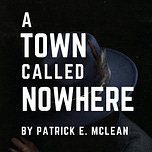

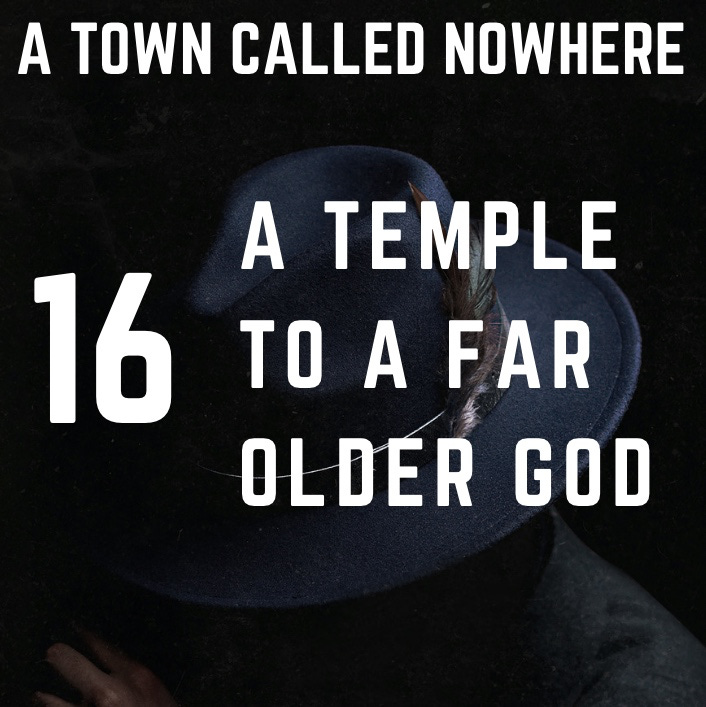

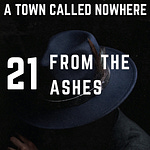
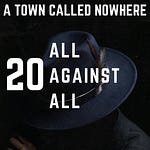
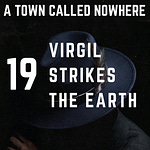



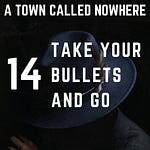
Share this post